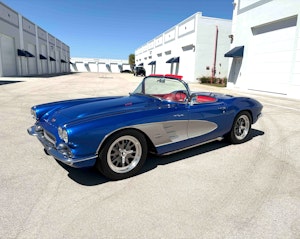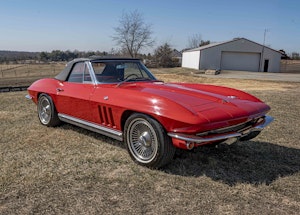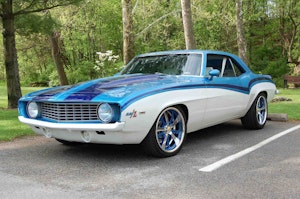Media | Articles
How to turn $47K lot trash into $116K auction treasure
If there is any sacrament left to us in this degraded age—this unendearingly departed decade of decline, with its tiresome genuflection before food trucks, its orgiastic idolatry of spiralling real-estate prices on the avenues of the elect, its Olympic-platform swan dive into the Narcissus pool of our own social-media bellybuttons, the saccharine-sweet melange of cynicism and detachment which washes over everything we see and hear until we have a Moonlighting filter’s worth of obscurity standing between us and anything remotely resembling true meaning?
Then that sacrament is surely this: mere sincerity. So let me be sincere, if only for a moment.
I adore the Lincoln Continental. For what it is: a rapid, silent, spacious all-weather interceptor with the finest interior materials ever fitted to a mass-production American automobile. And for what it represents: an unashamed evocation of arguably purer days, when it was common for adults to have children rather than become children, when intact families were the rule rather than the exception, when neighborhoods bloomed and blossomed with endless and subtle messages of hierarchy and prosperity. Like the scene in John Updike’s Couples where Kennedy has just been shot but they have a black-tie dinner and dance anyway, in someone’s home, because it has been planned and because even their ad hoc thirtysomething anti-society has certain rules which must be obeyed. That sort of thing. You’d want to arrive to such a party in a Continental, although in November 1963 you might have to suppress a brief, involuntary shudder at the thought of how Camelot had come to an end in one.
The current Continental was meant, as its predecessors were, for a bifurcated world where Mom steered a wood-paneled station wagon and Dad drove a proper automobile to the office. One took the Country Squire to the pool on summer days, and one sailed the Lincoln to dinner while the children slept at home. (In all fairness, these Lincolns often sailed back home on a wave of socially-acceptable alcohol and sometimes did not complete their trips unscathed.) It was a good system, but it was not meant to last. Our relentless societal drive to become completely interchangeable economic units, adaptable at a moment’s notice to the needs of an Agile timeline, an Amazon disruption, or a #REF! in our managing director’s Excel file, has stripped that distinction from us. Now both Mom and Dad work the same jobs, struggle under the same expectations, harbor the same pitiable dreams, and drive identical five-door pods branded as an afterthought with this month’s most favorable lessor.
Marketplace
Buy and sell classics with confidence
20200107170332)
Our society’s incomprehensible insistence that all of our vehicles be ready to tackle the Khyber Pass at a moment’s notice has considerably sapped the energy of luxury sedans, from S-Class to Genesis G90 to Continental. Your humble author is embarrassed to note that he drives a 2018 Lincoln MKT Reserve Elite rather than the equivalent Lincoln sedan, because his son races bicycles and the MKT is considerably easier to adapt to this task. When the MKT wears out, he will buy an Aviator, preferably in Rhapsody Blue. When that wears out and he is an empty-nester, only then will he be able to gratify his Continental desires. By then, of course, it will be too late to buy one from a showroom.
This is the third year in a row there’s been a decline in sales of the big Lincoln, which now idles along at about 500 units a month. I’ve been told by the Internet know-it-alls that the Continental’s price is part of the problem; although it starts at $47K, when you add a few features it gets into the 60s awfully quickly. A properly-equipped Black Label with the rear-seat package is knocking on the door of 80 grand. That’s LS500 money, and not too shy of S450 money. These cars are hard to sell. Maybe it’s because they are expensive.
Except, while the lower-end Continentals are predictably terrifying as a short-term resale proposition, the Black Label variants are doing quite well in that regard. A used Black Label retains value much like a Mercedes S560 sedan. I’m anecdotally told that the high-end models are also easier to move out of showrooms when they’re new. “I can sell $75,000 Continentals with little trouble,” a dealer said to me, “but the $50,000 ones are cobweb generators.”
Consider, if you will, the additional evidence of the Coach Door edition, a post-production-stretched variant in which the rear-seat room is unlimited and the heavily chromed door handles meet in the middle. It cost $110K at introduction. Eighty examples were made for 2019. They sold almost immediately. The first of them are coming up at auction now. It will be interesting to see how they do. The 2020 Coach Door Continentals received a $5000 price bump, a rare thing in American luxury cars nowadays, and they are expected to sell out in a hurry as well.
Could it be that the appetite for $100,000 American luxury cars is much stronger than the appetite for $50,000 variants of the same? It’s easy, if depressing, to make the social and economic case for this. Ours is a world in which the mixed fortunes and economic mobility of 1970s suburbia have rapidly yielded to a binary world of fixed-in-place haves and have-nots. You no longer have a bunch of 35-year-old middle-management fathers stretching a bit to buy a Lincoln or Cadillac; their modern successors are either ordering new $120K Teslas out of this year’s bonus or driving their six-year-old Camrys for Uber at night in order to bring the ends that much closer to meeting. My childhood was surrounded by the subtle gradations of success signified with “Regency Elite” and “Park Avenue,” but today all the moms in those neighborhoods lease the same German-badged, American-assembled tall wagons, about which virtually no one cares after the first week of ownership. They’re big rolling boxes made of ticky-tacky, and they all look just the same.
The pathetic pattern of that stultifying silver-toned sameness implies a market, however small, in dealing with the few people who have the courage to defy said pattern. But those people aren’t going to choose a $46,600 Continental Select FWD in Stone Silver for that job. In fact, the existence of such a vehicle is directly harmful to the prospects of the $76K Black Label and $116K Coach Door.
Which makes the right move here very obvious. You cull the rental-special trim levels. You raise the base price of the Continental to $99,990 and make sure that price is on every back page of every WSJ. You offer it in a tsunami of designer editions and outrageous colors. And you make sure that the next generation of the Continental (and the CT6, should such a thing happen and should the good Lord allow it to be called Fleetwood) is designed from the start to be 215 inches long and absolutely spectacular-looking. An American take on the Rolls-Royce Ghost, at half the price. It worked before—that’s how we got the Iacocca Marks and Continentals in the first place. It could work again.
Should such a vehicle arrive, I’d have to get rid of my MKT and buy it. Even if my Equifax gagged, even if my son complained, even if the neighbors talked, even if I lost a bit of that command seating position in the process. I could love such a Continental. Wholeheartedly, without ironic detachment or unearned cynicism. I am ready to love such a Continental. I cannot be the only person who feels this way about this and many other similar things. The tide is ready to turn. It’s a new decade. Time for a new lease on life for the American luxury sedan. One stellar final act before they herd us into the stinking beige-plastic mobility boxes for all eternity to come. Let us pray for such a Continental and for an America which is worthy to receive it. Amen.
20200107165945)








20200107170043)
20200107170326)
20200107170337)
20200107170347)

